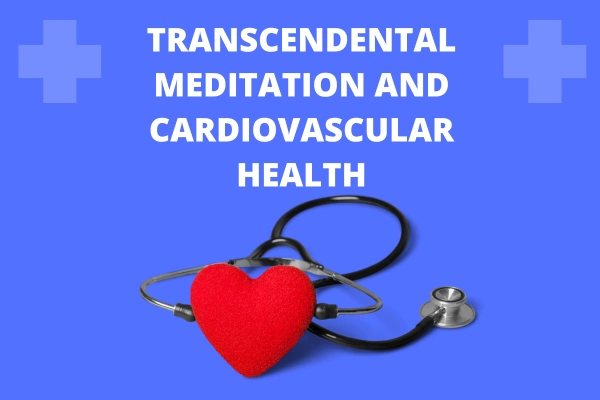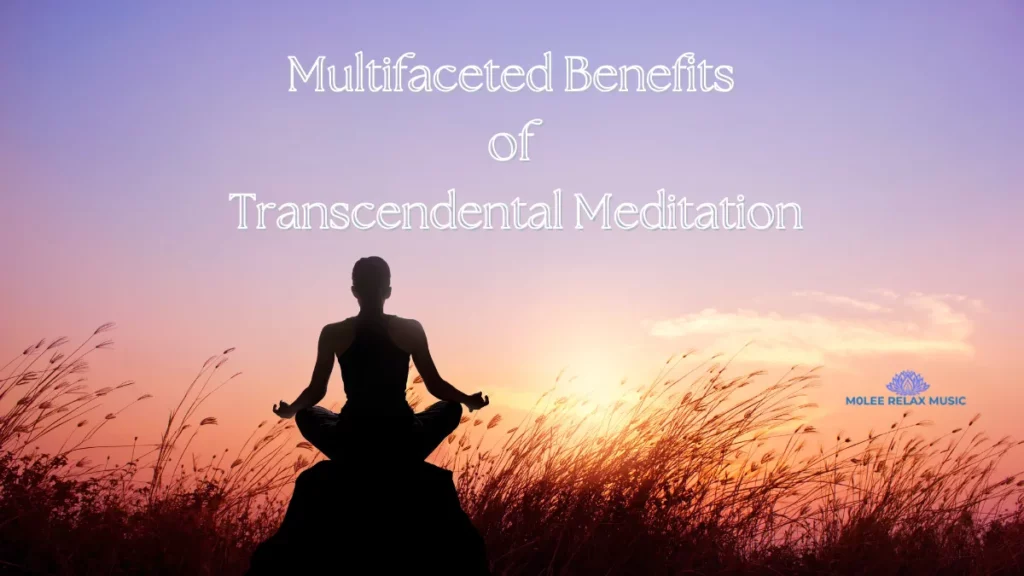|
Getting your Trinity Audio player ready…
|
Transcendental meditation does more than ease the mind. It holds the key to heart health. But how? Scientific research studies on transcendental meditation and cardiovascular health are now backing what sages have long believed: quieting the mind can strengthen the heart.
In this exploration, we dive into the heart of the matter, uncovering the potent effects of meditation on our most vital organ. From reducing stress to reshaping our cardiovascular responses, the benefits are profound.
Join us as we decode the science behind each heartbeat, revealing a path to wellness that begins and ends within.
- The Heart of Meditation: Exploring the Connection Between TM and Cardiovascular Health
- Delving into the Heart Rate Phenomenon: Before, During, and After Meditation
- Heart rate dynamics explained: Understanding the average heart rate after meditation
- Comparative analysis: Heart rate before and after meditation
- The low heart rate during meditation: A sign of deeper relaxation or something more?
- Exploring the monk heart rate mystery: How deep meditation affects heart rhythms
- Unveiling the Benefits: How Transcendental Meditation Nurtures Your Heart
- Addressing Common Queries Around Heart Rates and Meditation
- Evidence-Based Benefits: What Scientific Research Says About Transcendental Meditation and Heart Health
- 1. Effects of cardiac rehabilitation with and without meditation on myocardial blood flow using quantitative positron emission tomography: A pilot study
- 2. Transcendental Meditation in the prevention and treatment of cardiovascular disease and pathophysiological mechanisms: An evidence-based review
- 3. Prevention and Treatment of Cardiovascular Disease in Adolescents and Adults through the Transcendental Meditation® Program: A Research Review Update
- 4. Effects of a Randomized Controlled Trial of Transcendental Meditation on Components of the Metabolic Syndrome in Subjects With Coronary Heart Disease
- 5. Psycho social Stress and Cardiovascular Disease Part 2: Effectiveness of the Transcendental Meditation Program in Treatment and Prevention
- Final Thoughts
- FAQs on Transcendental Meditation and Cardiovascular Health
- 1. What is TM in cardiology?
- 2. Can meditation unclog arteries?
- 3. How can I strengthen my cardiovascular system?
- 4. Can transcendental meditation heal the body?
- 5. Does meditation increase HDL?
- 6. Does meditation reduce heart attacks?
- 7. Can meditation prevent stroke?
- 8. Can meditation stop panic attacks?
- 9. What is meditation for the heartbeat?
- 10. Why does my heart rate go up when I meditate?
- 11. What happens after 1 year of meditation?
The Heart of Meditation: Exploring the Connection Between TM and Cardiovascular Health
The intertwining of transcendental meditation (TM) with our heart’s rhythm is profound, backed by both ancient wisdom and modern science.
But what happens when we close our eyes and transcend the surface of our consciousness? The answers lie in the quiet.
Does meditation help with cardiovascular health?
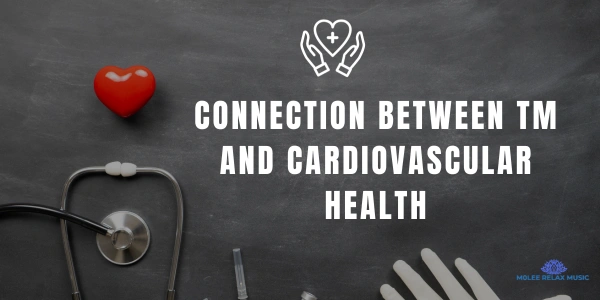
Yes, and significantly so. TM goes beyond mere relaxation. It actively contributes to cardiovascular health. Each session can be a step toward lowering blood pressure and reducing heart-related risks.
It’s not just about stress relief. It’s about physiological healing, a silent therapy session for the heart.
As we settle into meditation, our heart rate slows. Blood pressure drops. The chaotic symphony within finds harmony. This state isn’t just a reprieve.
It’s the cultivation of a new normal for our cardiovascular system. The heart learns to thrive in calmness, carrying these lessons into the hustle of daily life.
Overview of TM’s effects on the heart and blood vessels
TM’s influence is systemic, improving the entire cardiovascular landscape. It eases the workload on the heart, allowing for more efficient circulation. Arteries relax, offering less resistance and more freedom for blood flow.
It’s like clearing out a traffic jam inside your blood vessels, creating open highways for your circulation.
But the benefits don’t stop at mechanics. TM also plays a role in heart disease prevention. It’s linked with lower cholesterol levels, a major player in heart health.
By keeping this lipid in check, TM practitioners may find themselves with cleaner, more flexible arteries.
Dr. Suzanne Steinbaum Advocates Transcendental Meditation for Heart Health Resilience
Dr. Suzanne Steinbaum, a renowned figure in cardiology and Women’s Heart Health advocate at New York’s Lenox Hill Hospital, emphasizes the critical role of stress management in cardiovascular well-being.
She endorses Transcendental Meditation® as a pivotal tool for combating stress disorders, citing compelling research showcasing its efficacy in lowering hypertension and significantly reducing heart attack and stroke risks.
Insights into how TM promotes cardiovascular health
The promotion of cardiovascular health through TM is multifaceted. Firstly, it reduces stress hormones, notorious for straining the heart. Less strain means less wear and tear, preserving the heart’s youthful vigor.
Additionally, TM fosters deep rest, which is golden for heart recovery. It’s during these quiet moments that the heart repairs and rejuvenates itself. Imagine it as quality downtime for your heart, away from the constant hammering of stress.
Lastly, TM encourages a lifestyle that complements heart health. Regular practitioners often report increased mindfulness about their health choices, from diet to exercise and sleep, forming a holistic shield against cardiovascular ailments.
In essence, TM offers more than a moment of calm. It’s a lifeline for the heart, a dedicated ally in the fight for cardiovascular health. Each session is a step toward not just a calmer mind, but a stronger, more resilient heart.
Delving into the Heart Rate Phenomenon: Before, During, and After Meditation
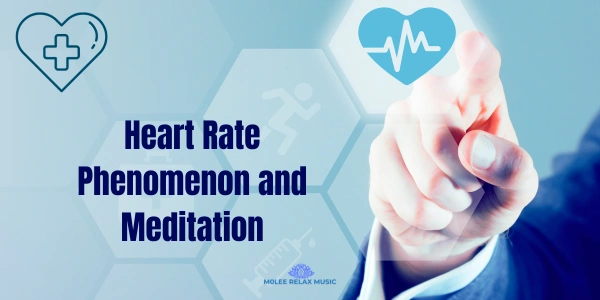
Meditation and heart rate share a unique bond, each session weaving a tale of internal calm.
But what do the numbers truly tell us?
Let’s decode the heart’s whispers post-meditation.
Heart rate dynamics explained: Understanding the average heart rate after meditation
Post-meditation, the heart slows down. It’s a sign – the body is in a state of deep rest. The average heart rate dips, signaling peace. But it’s not just about lower numbers. This relaxed pace gives your heart a much-needed break, a chance to recover from daily stresses.
Comparative analysis: Heart rate before and after meditation
Before meditation, our heart rate can be high, a testament to internal chaos. Meditation acts like a soothing balm. The heart rate charts tell the story: a noticeable drop post-meditation is common. It’s evidence of a physiological shift, the body embracing tranquility.
The low heart rate during meditation: A sign of deeper relaxation or something more?
A dip in heart rate during meditation is intriguing. It’s not merely relaxation. It’s a dive into a state of profound rest, deeper than sleep. Here, healing processes ignite, and the heart takes a respite, bathing in a sea of calm. This isn’t just rest; it’s restoration.
Exploring the monk heart rate mystery: How deep meditation affects heart rhythms
Monks show us the zenith of meditation’s impact. Their heart rates during deep meditation plummet, reaching levels of profound calm. It’s not supernatural; it’s supreme mastery of the mind-heart connection.
They journey to realms within, where the heart rate is but a gentle echo, showcasing the extraordinary possibilities residing in disciplined practice.
This section isn’t just about numbers. It’s a narrative of the heart, finding its rhythm in the silence of meditation. It’s proof that beneath the stillness, there’s a revolution taking place, one heartbeat at a time.
Read our full article on Transcendental Meditation and ADHD.
Unveiling the Benefits: How Transcendental Meditation Nurtures Your Heart
Transcendental meditation (TM) offers a sanctuary, not just for the mind, but significantly for the heart. It’s a silent healer, working in the background, mending and fortifying with each session.
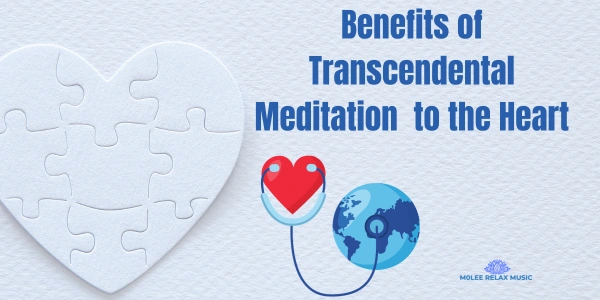
Transcendental meditation benefits the heart: From rhythm to resilience
TM’s impact on the heart is multifaceted. It’s not just about steadying the rhythm; it’s about building resilience. Here’s how:
- Stress Reduction: Less stress means less pressure on your heart, plain and simple.
- Enhanced Recovery: Post-stress recovery speeds up, easing the heart’s workload.
- Stabilizing Heart Rhythms: TM helps regulate your heart’s rhythm, keeping dangerous irregularities at bay.
It’s a holistic upgrade, a strengthening unseen by the naked eye but felt with each heartbeat.
Heart meditation benefits: Beyond the calm
The calm is evident, but the benefits of heart meditation seep deeper:
- Lower Blood Pressure: A boon for the heart, easing its strain.
- Reduced Inflammation: Less inflammation means lower heart disease risks.
- Improved Circulation: Good blood flow equals a happy heart.
These aren’t just temporary perks. They’re long-term investments in your heart’s future, solidifying a foundation for robust cardiovascular health.
Can meditation unclog arteries and strengthen my cardiovascular system?
The thought of meditation unclogging arteries might seem far-fetched, but the reality is a tad less dramatic and equally promising. No, meditation doesn’t act like a roto-rooter for your arteries.
However, it significantly contributes to a healthier cardiovascular system. Here’s what it does:
- Reduces Harmful Cholesterol Levels: Less bad cholesterol equals fewer clogs.
- Promotes Arterial Health: Healthy arteries are flexible and clear.
- Encourages a Heart-Healthy Lifestyle: Less stress often equates to better choices, leading to a healthier heart.
So, while it’s not scrubbing your arteries clean, meditation supports the conditions that keep them healthy. It’s about the environment you create within your body—one where your heart can thrive, unencumbered.
In this section, we’ve unpacked the treasure trove of benefits that TM brings to our hearts. It’s more than a practice; it’s a guardian, armed with an arsenal of tools to protect our most vital organs. Each benefit is a piece of a larger puzzle, a step towards not just surviving but thriving.
Addressing Common Queries Around Heart Rates and Meditation
When it comes to meditation and heart rates, curiosity abounds. Let’s tackle this head-on, shedding light on the heart’s intimate dance with meditation.
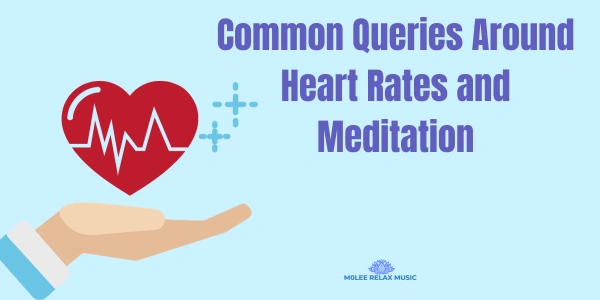
Why does the heart rate increase during meditation?
An uptick in heart rate during meditation can puzzle many. It’s often a sign of the body’s initial resistance to change, a natural response before the dive into deep calm.
Sometimes, it’s the release of pent-up stress, an emotional unblocking that momentarily speeds up the heart. It’s a phase, not a mainstay.
What should my heart rate be during meditation?
There’s no one-size-fits-all number. During meditation, your heart rate should be lower than your usual resting rate, indicating relaxation. But remember, each body is unique.
The key lies in consistent practice, leading to gradual improvements over time. It’s your journey, not a race.
Guided meditation for heart health: A pathway to a stronger heart?
Absolutely. Guided meditation isn’t just a soothing voice leading you; it’s a structured approach to heart wellness. Here’s why it’s a powerhouse:
- Targeted Techniques: Specific methods focus on heart health, and optimizing cardiovascular function.
- Expert Guidance: Skilled instructors help navigate the journey, enhancing the experience’s effectiveness.
- Community Support: Often, you’re not alone, and shared experiences can bolster commitment.
It’s a guided tour to your heart’s well-being, every step curated for maximum impact.
Does meditation lower heart rate? Deciphering the truth
Yes, it does. But it’s not just about slowing down; it’s about creating a sustainable rhythm. Meditation trains your heart to work efficiently, not hastily.
It’s like teaching your heart to find its natural, unhurried pace — a healthy habit that can contribute to longevity.
In this section, we’ve demystified common queries, bridging the gap between wonder and understanding. The heart’s relationship with meditation is nuanced, a delicate balance that, when maintained, ushers in a cascade of benefits. It’s not shrouded in mystery but bathed in clarity, awaiting your discovery.
Evidence-Based Benefits: What Scientific Research Says About Transcendental Meditation and Heart Health
Navigating the intersection of science and mindfulness, we turn to rigorous research studies that illuminate the profound effects of transcendental meditation on heart health. These five key studies unravel the tangible benefits hidden within this silent practice, reinforcing what practitioners have experienced for centuries. Let’s explore.
1. Effects of cardiac rehabilitation with and without meditation on myocardial blood flow using quantitative positron emission tomography: A pilot study
The research paper [1] focuses on the impact of stress reduction through Transcendental Meditation (TM) during cardiac rehabilitation (CR) on coronary heart disease (CHD) in African-American patients. The study is premised on the recognition of psychosocial stress as a significant risk factor for CHD, particularly noting the high incidence rates among African Americans.
Background of the Study:
Traditional CR is centered around aerobic exercise and medical management but often overlooks the critical component of psycho social stress, which is a notable precursor to CHD.
Previous studies have indicated that TM might reduce CHD risk factors and clinical events, providing a rationale for its inclusion in CR programs. However, despite promising preliminary data, stress reduction therapies are not routinely integrated into CR regimens.
The Method Used:
The pilot study engaged 56 CHD patients, divided into groups undergoing CR, CR+TM, TM alone, or usual care. The primary outcome metric was myocardial flow reserve (MFR), assessed via 13N-ammonia positron emission tomography (PET).
The study spanned 12 weeks, with various secondary outcomes (CHD risk factors) also monitored. The data was analyzed for effect size (ES), considering the pilot nature of the study.
Results of the Study:
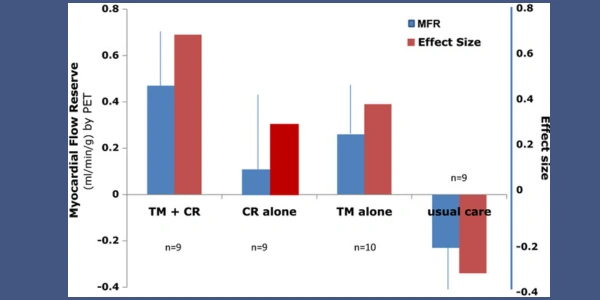
Notable improvements were observed in the CR+TM group, with MFR enhancements of +20.7% (ES= 0.64), and the TM-alone group showed a +12.8% increase (ES= 0.36). In contrast, the CR-alone and usual care groups experienced only modest changes.
Specifically, the combined TM group exhibited an MFR increase of +14% (ES= .56), contrasting with a -2.0% change (ES=−.08) in the combined No TM group.
The pilot data suggests a potential benefit of integrating TM into standard CR programs or using TM independently to enhance myocardial flow reserve in African American CHD patients.
These preliminary findings advocate for more extensive, controlled clinical trials to conclusively determine the effects and potentially inform future CR protocols.
2. Transcendental Meditation in the prevention and treatment of cardiovascular disease and pathophysiological mechanisms: An evidence-based review
According to this study [2], Cardiovascular disease (CVD) remains the top cause of fatalities globally, despite medical advancements. The American Heart Association suggests Transcendental Meditation (TM) as a potential practice to lower blood pressure and reduce CVD risks.
Background of Study:
Stress is a significant risk factor for coronary heart disease (CHD), linked to various stressors and negative emotional responses.
The study explores how TM impacts the pathophysiological mechanisms of CVD, considering its potential for stress reduction and overall cardiovascular health.
The Method Used:
The research involved a comprehensive review of meta-analyses, systematic reviews, and clinical trials focusing on TM’s effects on CVD.
It examined TM’s impact on various CVD risk factors, including hypertension, psychosocial stress, and smoking, among others.
Results of Study:
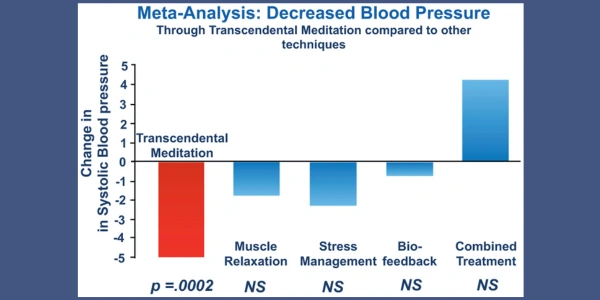
TM positively influences CVD pathophysiological mechanisms, reducing risk factors like hypertension and psycho social stress.
It has been associated with a decrease in mortality rates due to CVD and cancer, with a 48% reduction in myocardial infarction, stroke, and overall mortality.
Notably, TM was found to reduce systolic blood pressure by an average of 4.7 mm Hg and diastolic blood pressure by 3.2 mm Hg in practitioners compared to control groups.
TM shows substantial promise in reducing CVD risk factors and improving cardiovascular health, moving from an alternative method to a mainstream healthcare approach.
The practice’s broad range of health benefits warrants further investigation and consideration for clinical application in CVD prevention and treatment.
3. Prevention and Treatment of Cardiovascular Disease in Adolescents and Adults through the Transcendental Meditation® Program: A Research Review Update
The paper [3] explains that Cardiovascular diseases (CVD) are a leading cause of death, significantly influenced by stress and lifestyle factors.
The study reviews the impact of the Transcendental Meditation (TM) program on cardiovascular health, focusing on its potential to reduce stress and control blood pressure, thereby preventing and treating CVD.
Background of Study:
Cardiovascular disease remains a critical global health issue, with stress being a primary contributor to disease development.
The TM program is suggested as a non-pharmacological intervention to reduce stress and manage cardiovascular risk factors, especially in young individuals and adolescents.
The Method Used:
This comprehensive review analyzes various studies, clinical trials, and meta-analyses focusing on the effects of the TM program on cardiovascular health.
It considers a wide range of subject populations, including minorities and youth, assessing outcomes like blood pressure reduction, stress management, and overall cardiovascular risk.
Results of Study:
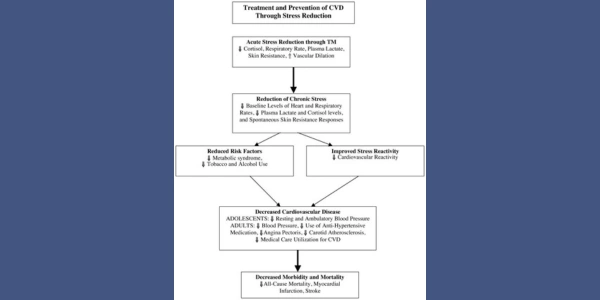
TM practice showed a reduction in both systolic and diastolic blood pressure among adolescents and adults, contributing to a lower risk of developing hypertension and CVD.
It significantly reduced psychological stress and sympathetic nervous system activity, factors directly linked to cardiovascular strain.
The program also influenced lifestyle choices positively, reducing substance use and promoting healthier living, further aiding cardiovascular health.
Cardiovascular Reactivity to Stress: TM practice helped in moderating cardiovascular reactivity to stress, a key factor in hypertension development. Studies indicated that adolescents practicing TM showed reduced blood pressure reactivity to stress, contributing to a lower risk of future hypertension and cardiovascular disease.
Lifestyle Improvements: Participants engaged in the TM program exhibited positive changes in lifestyle choices, directly impacting cardiovascular health. The research highlighted a reduction in substance use, including lower alcohol and cigarette consumption, contributing to the program’s cardiovascular benefits.
The TM program offers a beneficial, non-invasive approach to significantly reduce the risk factors associated with cardiovascular disease, emphasizing its importance in both prevention and treatment strategies.
Its applicability and success across various age groups and demographics highlight its potential as a universal stress reduction and health improvement method.
4. Effects of a Randomized Controlled Trial of Transcendental Meditation on Components of the Metabolic Syndrome in Subjects With Coronary Heart Disease
This study [4] investigates the impact of Transcendental Meditation (TM) on individuals with Coronary Heart Disease (CHD), focusing on how it affects various components of the metabolic syndrome, a cluster of conditions that increase the risk of heart disease, stroke, and type 2 diabetes.
Background of Study:
The metabolic syndrome, characterized by conditions like hypertension, high blood sugar, excess body fat, and abnormal cholesterol levels, significantly contributes to the risk of cardiovascular diseases. Previous studies suggest that stress-related neurohumoral activation might be a contributing factor to this syndrome, and practices like TM could potentially have a positive effect.
The Method Used:
The research was conducted as a randomized, placebo-controlled clinical trial over 16 weeks, involving 103 subjects with stable CHD. Participants were divided into two groups: one practicing TM and the other receiving health education. The study measured blood pressure, lipid profile, insulin resistance, endothelial function, and cardiac autonomic system activity.
Results of Study:
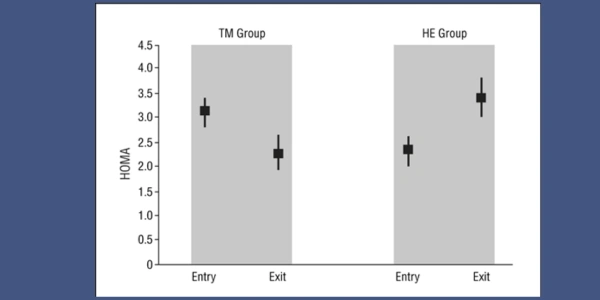
The TM group exhibited significant improvements in several areas compared to the control group. Notably, there were beneficial changes in blood pressure (a decrease of 3.4 mm Hg) and insulin resistance (a reduction of 0.75 units as measured by the homeostasis model assessment).
Additionally, heart rate variability, an indicator of cardiac health, improved by 0.10 units. However, there was no substantial impact observed concerning brachial artery reactivity testing.
Cardiac Autonomic System Activity: One of the standout improvements was in heart rate variability, which increased by 0.10 units. Enhanced heart rate variability indicates better autonomic control of the heart, signifying improved cardiovascular functioning and resilience.
The practice of Transcendental Meditation for 16 weeks showed a positive effect on components of the metabolic syndrome in individuals with CHD.
Improvements were observed in blood pressure, insulin resistance, and cardiac autonomic tone, suggesting that TM could be a beneficial therapeutic approach for managing CHD risk factors, potentially offering a novel avenue for treatment.
5. Psycho social Stress and Cardiovascular Disease Part 2: Effectiveness of the Transcendental Meditation Program in Treatment and Prevention
This study [5] explores the impact of psycho social stress, a nontraditional risk factor for cardiovascular issues, and the effectiveness of the Transcendental Meditation (TM) program in managing this stress and preventing related health complications.
Background of Study:
Previous research has identified psycho social stress as a significant contributor to cardiovascular disease (CVD). Various interventions targeting this type of stress have been implemented, with varying success rates.
The TM program, rooted in a natural medicine approach, has shown promise in reducing both psycho social and traditional risk factors for CVD.
The Method Used:
The researchers conducted a thorough review of existing studies, focusing on randomized controlled trials, meta-analyses, and other controlled studies. These studies examined the effects of the TM program on various risk factors and pathophysiological changes related to cardiovascular disease.
Results of Study:
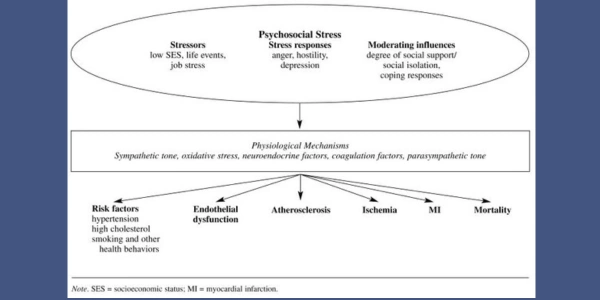
The TM program demonstrated substantial health benefits, including reductions in blood pressure, carotid artery intima-media thickness, and myocardial ischemia. It also showed a decrease in instances of left ventricular hypertrophy and overall mortality rates.
Specifically, the program resulted in:
A reduction in systolic blood pressure by an average of 11 mm Hg and diastolic blood pressure by 6 mm Hg.
Decreased rates of mortality, with participants showing a 23% reduction in mortality rates compared to non-participants.
The Transcendental Meditation program is an effective intervention for reducing psycho social stress, a critical risk factor for cardiovascular disease.
Its benefits extend to various traditional risk factors and contribute to the slowing or reversal of the progression of changes that underlie cardiovascular disease. The program’s effectiveness is comparable to conventional interventions used for secondary prevention.
Final Thoughts
In conclusion, the synergy between transcendental meditation and cardiovascular health is both profound and scientifically substantiated. Through various studies and personal accounts, we’ve seen how this practice extends beyond mental tranquility, offering tangible benefits for heart functionality and resilience.
As we embrace the stillness within, we unknowingly fortify our heart’s health, crafting a silent refuge for one of our body’s most vital organs. This journey through meditation is not just a pathway to inner peace but a holistic approach to wellness, where every heartbeat resonates with the echoes of centuries-old wisdom.
Read our full article on Transcendental Meditation and Anxiety.
References:
- Bokhari S, Schneider RH, Salerno JW, Rainforth MV, Gaylord-King C, Nidich SI. Effects of cardiac rehabilitation with and without meditation on myocardial blood flow using quantitative positron emission tomography: A pilot study. J Nucl Cardiol. 2021 Aug;28(4):1596-1607. doi: 10.1007/s12350-019-01884-9. Epub 2019 Sep 16. PMID: 31529385; PMCID: PMC9178923. https://www.ncbi.nlm.nih.gov/pmc/articles/PMC9178923/
- Schneider RH, Carr T. Transcendental Meditation in the prevention and treatment of cardiovascular disease and pathophysiological mechanisms: An evidence-based review. Adv Integr Med. 2014 Dec;1(3):107-112. doi: 10.1016/j.aimed.2014.08.003. Epub 2015 Apr 2. PMID: 35813238; PMCID: PMC9262039. https://www.ncbi.nlm.nih.gov/pmc/articles/PMC9262039/
- Barnes VA, Orme-Johnson DW. Prevention and Treatment of Cardiovascular Disease in Adolescents and Adults through the Transcendental Meditation(®) Program: A Research Review Update. Curr Hypertens Rev. 2012 Aug;8(3):227-242. doi: 10.2174/157340212803530411. PMID: 23204989; PMCID: PMC3510697. https://www.ncbi.nlm.nih.gov/pmc/articles/PMC3510697/
- Paul-Labrador M, Polk D, Dwyer JH, et al. Effects of a Randomized Controlled Trial of Transcendental Meditation on Components of the Metabolic Syndrome in Subjects With Coronary Heart Disease. Arch Intern Med. 2006;166(11):1218–1224. doi:10.1001/archinte.166.11.1218 https://jamanetwork.com/journals/jamainternalmedicine/fullarticle/410453
- Walton KG, Schneider RH, Nidich SI, Salerno JW, Nordstrom CK, Bairey Merz CN. Psychosocial stress and cardiovascular disease Part 2: effectiveness of the Transcendental Meditation program in treatment and prevention. Behav Med. 2002 Fall;28(3):106-23. doi: 10.1080/08964280209596049. PMID: 16463759; PMCID: PMC2789000. https://www.ncbi.nlm.nih.gov/pmc/articles/PMC2789000/
FAQs on Transcendental Meditation and Cardiovascular Health
1. What is TM in cardiology?
TM in cardiology refers to transcendental meditation, a stress-reduction technique that enhances heart health by lowering blood pressure and reducing cardiac risk.
2. Can meditation unclog arteries?
While meditation doesn’t directly unclog arteries, it lowers stress and inflammation, contributing to reduced plaque formation and improved arterial health.
3. How can I strengthen my cardiovascular system?
Strengthen your cardiovascular system by combining regular physical activity, a balanced diet, and stress-reducing practices like transcendental meditation.
4. Can transcendental meditation heal the body?
Transcendental meditation promotes holistic healing, reducing stress-related disorders and enhancing overall physical and mental well-being.
5. Does meditation increase HDL?
Meditation is linked to healthier lifestyles and stress reduction, potentially leading to increased levels of HDL (‘good’ cholesterol) in the body.
6. Does meditation reduce heart attacks?
Regular meditation reduces stress and hypertension, key factors in heart attacks, thereby lowering the overall risk of cardiac events.
7. Can meditation prevent stroke?
Through stress reduction, lower blood pressure, and improved cardiovascular health, meditation can play a role in reducing stroke risk.
8. Can meditation stop panic attacks?
Meditation helps manage panic attacks by training the mind to achieve calmness, reducing anxiety triggers, and improving emotional regulation.
9. What is meditation for the heartbeat?
Meditation for the heartbeat refers to practices that stabilize heart rhythms, enhance cardiovascular efficiency, and promote heart health.
10. Why does my heart rate go up when I meditate?
An initial increase in heart rate during meditation can occur due to emotional releases or the body’s natural response to relaxation shifts.
11. What happens after 1 year of meditation?
After 1 year of meditation, individuals often experience enhanced mental clarity, improved stress management, and overall increased well-being, contributing to healthier lifestyle choices.
